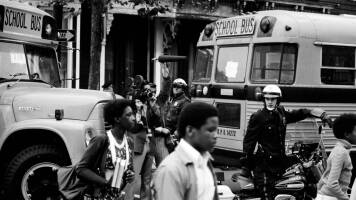Forum Network
Free online lectures: Explore a world of ideas

Background
In our first program, Driving for Desegregation: Boston 50 Years After Busing, Adrian Walker, columnist for The Boston Globe, led a panel that explored the long-term impacts of busing on the city of Boston, including the current state of Boston’s public schools and racial equity in a myriad of arenas. In our second program held last week, our panel, moderated by Stephanie Leydon, GBH News, the panel explored race, housing, and education equity 50 years after busing. This discussion explored the impact of race-based discriminatory housing policies and education funding formulas while addressing the more recent problems of gentrification and housing affordability and how Boston positions itself to compete with its suburban neighbors when it comes to educational outcomes.
Explore the history of Boston’s busing crisis via the digital archives of The Boston Public Schools Desegregation Project, the GBH Archives, and Suffolk University’sMoakley Archive & Institute.